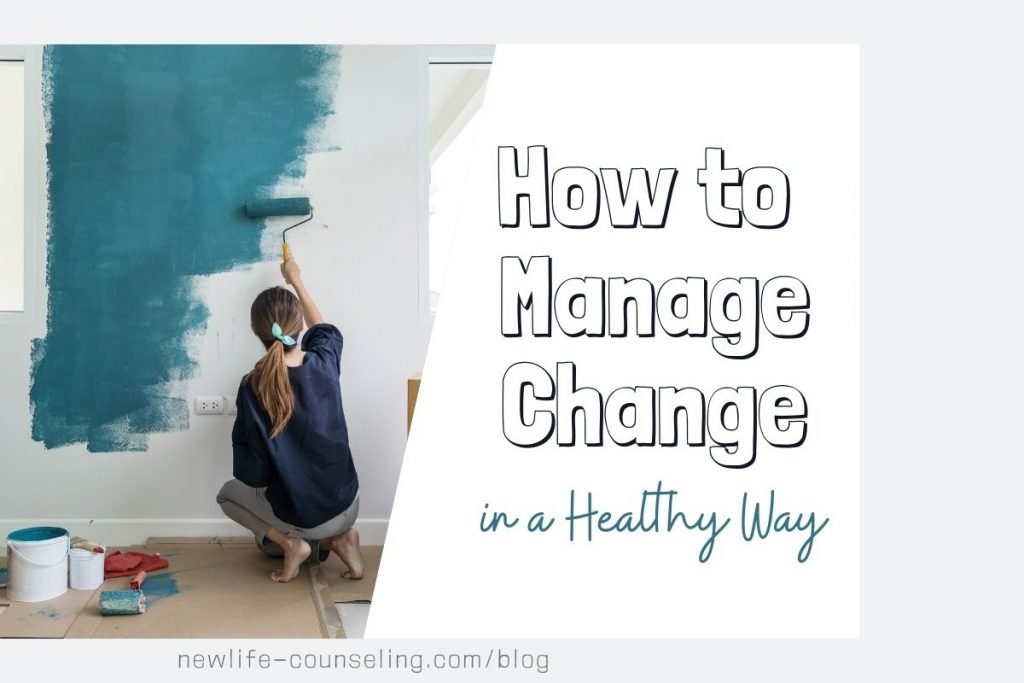How to Manage Change in a Healthy Way
Have you ever heard the saying, “The only constant in life is change?” That quote is by a Greek philosopher named Heraclitus. Heraclitus also has another famous quote, “No man ever steps in the same river twice, for it’s not the same river and he’s not the same man.”

My mentor once told me, “Change is not hard, it’s that people are naturally resistant to change.” That has never been truer than in my own life. Walking through my own difficult challenges and finding myself leaning on my faulty way of understanding tells me it “will always be this way” or makes me ask, “will this ever go away” or “will this ever change”.
Those thoughts leave me feeling frustrated and hopeless, so I’ve had a love-hate relationship with change. I know that things change, of course, I see that every day in something as simple as the weather, and when the weather changes from winter to spring: I welcome change with glee! However, when my routine is disrupted or some other big event happens that sets me off course, I naturally resist and want things to just stay the same.
Have you ever gone through a change such as your company downsizing or changing procedures, your church deciding to switch up how they do their worship service that has been the same for years, or how about your spouse wanting to make a big change in their own life but you perceive that it will affect you negatively? Those are the types of changes that bring that natural resistance.
How do you respond to that type of change?
Do you fear it? Do you resist or avoid it as much as possible? Do you go with the flow and embrace it?
Changes that we perceive as well, such as a new color of paint on our walls, a brand-new car, house, or haircut, can be exciting and embraced easily. However, change becomes even more challenging when it is sudden and without our approval.
The attitude that you have toward change will determine the quality of not only your day-to-day life but your overall life as well. Change is typically accompanied by fear because change involves the unknown. It involves risk, and for those who are not normally risk-takers, this is a foreign concept difficult to adjust to.
Change becomes even more challenging when it is sudden and without our approval.
Have you examined why you are resistant to change? Do you fear the effect that the change will have on you? Do you have fears that the people inflicting change upon you do not have your best interest at heart? Do you have a different opinion about the change being made and cannot communicate those opinions? Do you have a low tolerance for being uncomfortable?
Can I ask you another question?
Did you know there is a difference between stress and anxiety?
Well, there is! Sometimes, we react to stress in ways that make us think we have anxiety, when in fact, what we are experiencing is stress. The difference between stress and anxiety is that stress is based on external things, such as those listed above, and we can feel things in our bodies like irritability, anger, and difficulty sleeping.
Anxiety, on the other hand, is a persistent, excessive worry that won’t go away even in the absence of a stressor. Why do I point this out? Because when change happens, we need to understand how we are reacting to it – to be able to manage how we work through it.
You are not the only one in history to ever experience change and be fearful of it.
The Bible is full of stories of change, and the people who have gone through change brought positive things. For example, when Abraham leaves his home and goes to a foreign land (Genesis 12:1-3). Abraham went through some very difficult experiences in his journey. Without a doubt, he thought many times that he may have made a mistake, and he had to weigh the pain versus the blessing to decide if it was worth it. Consider Mary. Mary was asked to make a great sacrifice that would usher in the Savior of the world. Mary’s entire life changed, and she had to change the way she viewed God and what He could do in her life. God knows your struggle with change better than anyone. He has challenged His people throughout history to make changes, and they have not always been ones that we welcome with glee, like going from winter to spring.
So how can we become people who manage change in a healthy way?
Because change is constant, we must have a healthy attitude toward it if we want to live a full and content life. One way to train our brains to have a positive attitude toward change is to practice mindfulness.
Mindfulness is the simple act of focusing on the present in a non-judgmental way where we notice what is happening, and we accept it for what it is. There is a mindfulness practice that is derived from Dialectical Behavioral Theory (DBT). The practice is called radical acceptance, and I often use this with my clients struggling with substance use.
Radical acceptance is defined as having the ability to accept situations that are outside of our control without judging them. Which in turn reduces the suffering that is caused by them. When we stop fighting reality, and we stop responding with impulsive or destructive behaviors when things aren’t going our way or the way we expected them to, we can let go of the bitterness that keeps us trapped in the cycle of suffering.
We can repeat phrases to ourselves like,
“It is what it is,”
“Pain is not wrong,”
“This too shall pass,”
“It is possible for me to feel anxiety/stress but still effectively manage this situation,” and
“It’s better to take the right actions than keep judging or blaming.”
When we practice radical acceptance, we are essentially stopping ourselves from fighting reality. The reality is, things in your life are going to change. Your boss is going to make changes you might not like or agree with, your spouse is going to make some decisions that you disagree with, your children are going to grow up and live their own lives, you are going to experience death, and you are going to experience illness. We cannot prevent these things from happening, so we either accept them radically, or we resist them and suffer.
If you’re experiencing change that you cannot seem to move through in a healthy way, try some of these methods. If you’re still struggling, reach out to a professional counselor who can help guide you through this process. A counselor can help you tap into your wise mind, which is a balance of emotion and logic. I promise you, you may be uncomfortable right now, but you do not have to be uncomfortable forever.
You have more control than you think!
This post was written by Jessica Pottorff who is no longer with New Life Counseling

